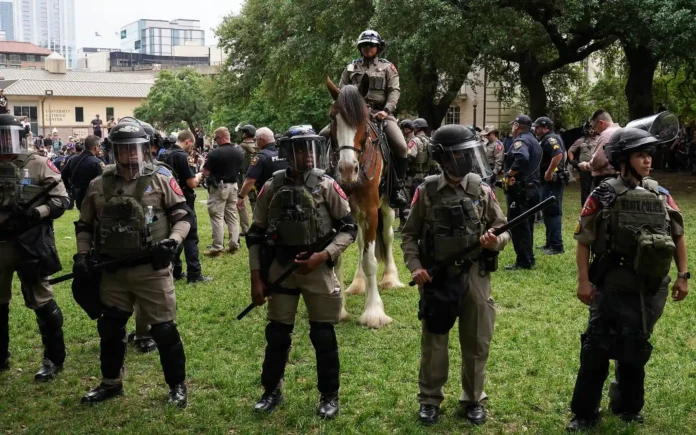Student protests against Israel on campuses across America erupted into clashes with law enforcement this Wednesday, as police arrested demonstrators at both the University of Southern California (USC) and the University of Texas at Austin (UT Austin).
The day began with simmering tensions at USC, where student protesters faced off against law enforcement officers.
As evening descended, a few dozen demonstrators, standing in a circle with locked arms, were detained one by one after defying orders to disperse. The scene unfolded without major incident, yet it underscored the intensifying friction between protesters and authorities.
Meanwhile, at UT Austin, the confrontations reached a boiling point as hundreds of local and state police, including mounted officers wielding batons, forcefully dispersed protesters.
In a chaotic scene, some demonstrators were sent tumbling into the streets amidst the clash. The University and Texas Governor Gregg Abbott authorized the arrests, resulting in 34 individuals being detained, according to the state Department of Public Safety.
The clashes at both campuses highlight the deepening divide over the Israeli-Palestinian conflict, with university campuses emerging as battlegrounds for divergent viewpoints. While some students advocate for Palestinian rights and condemn Israeli actions, others express support for Israel’s policies and actions.
The use of law enforcement to quell protests underscores the challenges faced by universities in managing unrest on campus.
In both instances, authorities resorted to arrests to maintain order, yet the contrasting approaches at USC and UT Austin raise questions about the appropriate response to student demonstrations.
At USC, where tensions escalated throughout the day, police opted for a more measured approach, detaining protesters individually as they sat in defiance of orders.
The scene drew a crowd of onlookers, with helicopters buzzing overhead, as the university ultimately closed its campus in response to the unrest.
Conversely, the heavy-handed tactics employed at UT Austin sparked outrage and condemnation from some quarters, with images of police officers clashing with students circulating widely on social media.
Critics argue that such tactics only serve to escalate tensions and stifle free expression on campus.
In response to the incidents, university officials at both USC and UT Austin issued statements reaffirming their commitment to upholding free speech while ensuring the safety of students and staff.
However, the clashes serve as a stark reminder of the challenges universities face in navigating the complexities of political activism and dissent on campus.
As tensions persist and protests continue, the clashes at USC and UT Austin serve as a microcosm of broader societal divisions over the Israeli-Palestinian conflict.
With emotions running high and opinions deeply polarized, the challenge of fostering constructive dialogue and peaceful coexistence remains paramount for campuses across America.
This article was created using automation and was thoroughly edited and fact-checked by one of our editorial staff members

